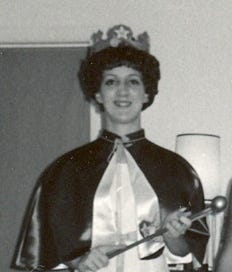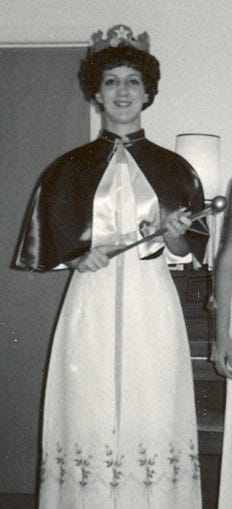Even though I was a Bible drill champion and had memorized countless verses, I was no match for the pastor. If anything, it was my reverence for scripture that made me all the more susceptible to his twisting of it, as he launched a barrage of Bible verses to compel my balking teen self to stop resisting what God wanted of me.
“Lean not unto thine own understanding,” he always recited, as he insisted it was a sin for me to keep trying so hard to understand.
How could I argue with the Bible? I had known it always and only as the word of God. To have run from it would have been like trying to run from my own soul. So, little by little, I became compliant and numb. Still, I kept trying to understand, and in my stubborn efforts, my adolescent grandiosity collided with my boundless faith.
He said that this was God’s special role for me—I was “chosen”—and that I was predestined to be a helpmeet for him in his holy work of advancing God’s kingdom. I believed that, in part, because I wanted to believe it. Doesn’t every teenager want to be special?
“Ye are not your own.” That was another one of the weaponized Bible verses that he would berate me with. In his translation, it meant that my body existed for the service of God and that it didn’t belong to me. Of course, he was the one to tell me what God wanted because he was an “anointed one”—an ordained pastor, a man of God.
No doubt many would say the verse is metaphorical, but I’d grown up in a faith that preached the Bible as the literal word of God. “The Bible says it, I believe it, that settles it.” Raised with that mindset, biblical authority held enormous power.
So, when he hammered away at “ye are not your own,” and chastised me for not turning my body over to “God’s will,” it started to make sense in my faith-addled brain. And it meshed with other lessons. From way back, I’d been taught that if I truly loved Christ, I had to be willing to “die to self.” So, that’s what I tried to do—to die to my own self.
And the pastor took my sacrificial body and savaged it, all in the name of God.
For months, I still kept struggling to understand. How could he and I be “married in God’s eyes,” like he said we were, when he already had a wife right here on earth—and a child too? But the pastor said I needed to attune my imagination to “God’s possibilities,” because God’s way would bring freedom from fretting.
“Be not conformed to this world,” he’d recite, “but be ye transformed … that you may prove what is that good and acceptable and perfect will of God.” It was still another verse that he’d use to insist I shouldn’t consider the standards of “the world” and should instead place my trust in God’s will for our relationship, because God’s will was perfect. This was his way of telling me it didn’t matter that he was already married, because the idea of one-man-one-woman was a standard of “the world,” and God’s will wasn’t limited like “the world” was.
Yeah, it was twisted. All these years later, I still find it painful to realize that I actually believed it. How could anyone be so stupid? And yet, I was not in fact a stupid girl. Instead, I was a faith-filled girl, and that’s different.
He didn’t like it when I asked too many questions. He would chastise me, asking, “Where would we all be if Mary hadn’t trusted God even when her special role was something she couldn’t understand?”
For anyone raised evangelical, the answer to that question was “hell.” If Mary hadn’t been willing to trust in what God wanted of her, however crazy it seemed, then human beings for all time-eternal would be in hell without a Savior. And we aren’t talking some mere metaphorical hell. The church I grew up in dished out a constant threat of a hyper-violent hell where those who rejected God would burn forever in a fiery inferno without ever getting the relief of burning up.
So, the admonition to be like Mary weighed heavily Not that I ever specifically imagined I would give birth to a Christ-child. I only believed what the pastor told me—that just as God had decreed a special role for Mary, so too did God have a special role for me. It wasn’t my place to try to understand but to simply live by faith in submission to God’s will. So that’s what I did.
As a girl who loved God, how could I have done otherwise? The first time I ever held a whole quarter in my hand, I spent it at the five-and-dime to buy a tiny ceramic baby Jesus—“the babe, wrapped in swaddling clothes, lying in a manger.” The option of saying no to God wasn’t within the realm of possibility. Like a fish in a barrel, I was trapped by the immutable boundaries of my own faith-based identity.
I expect some will consider me blasphemous to even imagine that I was somehow like the young Mary. But I wasn’t the one who first came up with the comparison. It was the pastor who specifically told me that I should be like Mary and have a faith like hers, trusting in God’s will no matter how incomprehensible it seemed. So that’s what I tried to do—to have the kind of strong faith that Mary had. None of it made any sense, but I pondered it all in my heart, just the way Mary did.
Sometimes I still ponder it. The girl I was then—the girl of infinite faith—flat-out terrifies me. Yet she is a part of me. To feel even an inkling of her presence in my consciousness is for my whole body to feel itself at death’s door and for my mind to sense a darkness so deep that I have to distract myself lest screams escape my throat.
I feel I could be cousin to some religious terrorist somewhere, because a part of me understands—viscerally knows—the horror of how, for love of God, someone could be convinced to do almost anything.
That’s the girl I was—the girl who would do anything for God.
This is an excerpt from my new memoir, Baptistland.





I have nothing but endless compassion for that poor baby still lost somewhere inside you. No, there was no possible way she could have known. All power to understand was forcibly taken away from her. Her body shut her brain off to keep her as safe as it could. If anything, that's a powerful form of wisdom. Terrible, but wise.
I hope some day you are given the safety, comfort, strength, and courage to rescue that little girl from the darkness where she still wanders and help her know at last it was never her fault. Some of us never can risk that rescue journey, and I understand if it remains too much for you. All I feel for her is compassion, though. Not one shred of blame.
Thank you for sharing so vulnerably! It really leaves me at a loss for words…
A couple of weeks ago, I purchased Baptistland and it is on my summer reading list. This excerpt has spurred me on to move it up the list!